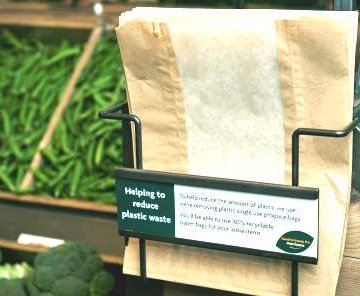- About
- Topics
- Picks
- Audio
- Story
- In-Depth
- Opinion
- News
- Donate
- Signup for our newsletterOur Editors' Best Picks.Send
Read, Debate: Engage.
Plastic bags are on the way out. The German federal government voted last week for a ban on all plastic bags in supermarkets, apart from those used for fruit and fresh produce. They are the “epitome of resource waste” said the Environment Minister Schulze, and he’s right: there are mass produced objects, made of oil, which are only used for a few minutes, and then discarded, despite their inability to biodegrade. Even the so-called ‘environmentally-friendly’ plastic bags are damaging, being only partly made up of biodegradable material.
There will be a six-month phase out period of the bags. Asked why fresh produce plastic bags can remain, the ministry answered that phasing them out would lead to more plastic packaging.
In 2015, many German supermarkets voluntarily gave up on offering customers plastic bags. This led to the average annual use of plastic bags per person in Germany going down to 20 in 2018 from 68 in 2016. So there is a demonstrable impact of such measures, and of course it is a positive step in helping the environment.
While the ban addresses resource waste, and also the problems of an unclean and unsafe environment (where animals consume plastic waste, for example), it does not make a significant dent in Germany’s approach to energy in general. This is an important distinction, as politicians will use the ban as a way of demonstrating Germany’s general commitment to greener energy, even though the two issues are only superficially related.
It’s actually rather easy to institute a nationwide ban on such objects, and to claim superiority in the fight against resource waste and climate change. Nevertheless, it does not address underlying structural issues such as reliance on fossil fuels, nor does it seriously put a dent in Germany’s carbon footprint.
Germany still relies on coal power in many regions, it still relies on gas piped in from Russia, and it still falls well below the climate goals it set for itself after the Kyoto protocols were agreed upon. Very much like the recent environmental plan announced by Angela Merkel, the plastic bag ban is a welcome step, but it does very little in actual terms to mitigate the climate crisis.
Nevertheless, it is a positive step. It may seem a little late in the day to institute a country-wide ban on plastic bags, given we’re so deep into a climate crisis, but it will have an impact on the behaviour of an entire nation. There will be more bans coming in the following years, if the climate crisis is taken seriously: perhaps all plastics will be banned from supermarkets, maybe cars will be banned from city roads, we might even see nationwide bans on the use of central-heating at certain hours of the day. Seeing that the first plastic bags ever made still won’t have degraded by the time of publication (and still won’t for several more decades), it’s worth taking these necessary measures.
The philosopher and cultural critic Slavoj Žižek, among others, has frequently mocked the European sense of commitment to green policies embedded in capitalism: recycling glass and plastic and feeling superior, whilst still being reliant on fossil fuels. It might be a hard pill to swallow, but he is right. We should recognise these bans for what they are: positive steps, but not nearly enough.
We all still have to do more to fight climate change and resource waste.

